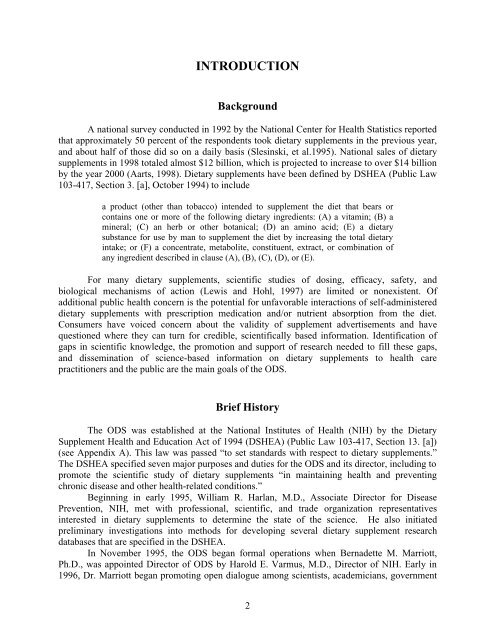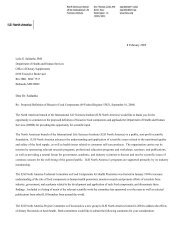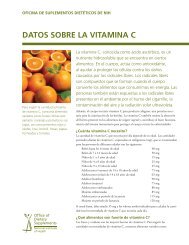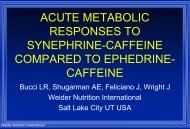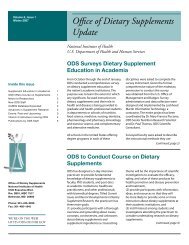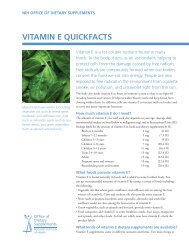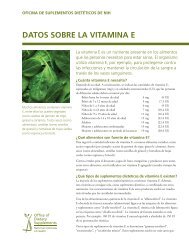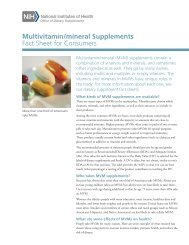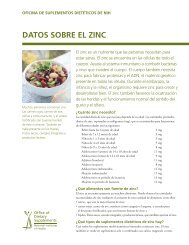status report - Office of Dietary Supplements - National Institutes of ...
status report - Office of Dietary Supplements - National Institutes of ...
status report - Office of Dietary Supplements - National Institutes of ...
Create successful ePaper yourself
Turn your PDF publications into a flip-book with our unique Google optimized e-Paper software.
INTRODUCTION<br />
Background<br />
A national survey conducted in 1992 by the <strong>National</strong> Center for Health Statistics <strong>report</strong>ed<br />
that approximately 50 percent <strong>of</strong> the respondents took dietary supplements in the previous year,<br />
and about half <strong>of</strong> those did so on a daily basis (Slesinski, et al.1995). <strong>National</strong> sales <strong>of</strong> dietary<br />
supplements in 1998 totaled almost $12 billion, which is projected to increase to over $14 billion<br />
by the year 2000 (Aarts, 1998). <strong>Dietary</strong> supplements have been defined by DSHEA (Public Law<br />
103-417, Section 3. [a], October 1994) to include<br />
a product (other than tobacco) intended to supplement the diet that bears or<br />
contains one or more <strong>of</strong> the following dietary ingredients: (A) a vitamin; (B) a<br />
mineral; (C) an herb or other botanical; (D) an amino acid; (E) a dietary<br />
substance for use by man to supplement the diet by increasing the total dietary<br />
intake; or (F) a concentrate, metabolite, constituent, extract, or combination <strong>of</strong><br />
any ingredient described in clause (A), (B), (C), (D), or (E).<br />
For many dietary supplements, scientific studies <strong>of</strong> dosing, efficacy, safety, and<br />
biological mechanisms <strong>of</strong> action (Lewis and Hohl, 1997) are limited or nonexistent. Of<br />
additional public health concern is the potential for unfavorable interactions <strong>of</strong> self-administered<br />
dietary supplements with prescription medication and/or nutrient absorption from the diet.<br />
Consumers have voiced concern about the validity <strong>of</strong> supplement advertisements and have<br />
questioned where they can turn for credible, scientifically based information. Identification <strong>of</strong><br />
gaps in scientific knowledge, the promotion and support <strong>of</strong> research needed to fill these gaps,<br />
and dissemination <strong>of</strong> science-based information on dietary supplements to health care<br />
practitioners and the public are the main goals <strong>of</strong> the ODS.<br />
Brief History<br />
The ODS was established at the <strong>National</strong> <strong>Institutes</strong> <strong>of</strong> Health (NIH) by the <strong>Dietary</strong><br />
Supplement Health and Education Act <strong>of</strong> 1994 (DSHEA) (Public Law 103-417, Section 13. [a])<br />
(see Appendix A). This law was passed “to set standards with respect to dietary supplements.”<br />
The DSHEA specified seven major purposes and duties for the ODS and its director, including to<br />
promote the scientific study <strong>of</strong> dietary supplements “in maintaining health and preventing<br />
chronic disease and other health-related conditions.”<br />
Beginning in early 1995, William R. Harlan, M.D., Associate Director for Disease<br />
Prevention, NIH, met with pr<strong>of</strong>essional, scientific, and trade organization representatives<br />
interested in dietary supplements to determine the state <strong>of</strong> the science. He also initiated<br />
preliminary investigations into methods for developing several dietary supplement research<br />
databases that are specified in the DSHEA.<br />
In November 1995, the ODS began formal operations when Bernadette M. Marriott,<br />
Ph.D., was appointed Director <strong>of</strong> ODS by Harold E. Varmus, M.D., Director <strong>of</strong> NIH. Early in<br />
1996, Dr. Marriott began promoting open dialogue among scientists, academicians, government<br />
2


